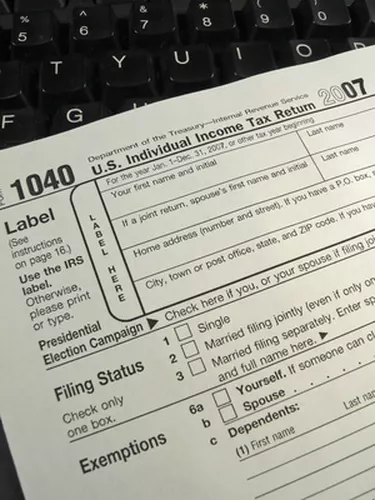
Tax season can be a blessing or curse. Nothing is worse than anticipating a large federal tax refund only to receive an IRS notice stating your refund has been intercepted. The IRS, Department of Education and Department of Treasury can seize your federal tax refund for delinquent child support, defaulted student loans and federal or state debt. Individual taxpayers may contact the Department of Treasury's Offset Program Call Center to determine whether their tax refund is scheduled for offset (see "Resources").
Federal and State Government Can Seize Your Tax Refund
Video of the Day
The federal government can seize your federal tax refund to repay student loans through the U.S. Department of Treasury's offset program. The U.S. Department of treasury can take a portion or all of your tax refund without your permission. The Internal Revenue Service can offset your tax refund if you owe a tax debt. The U.S. Department of Treasury Financial Management Service can offset or seize your tax refund if you have past due child support, debts owed to a federal agency, state income tax debt or unemployment compensation owed to the state.
Video of the Day
A Collection Agency Cannot Intercept Your Federal Refund
A debt collector cannot threaten to take possession of or garnish your property or wages unless they are entitled by law, according to the Federal Trade Commission. Currently, CBE Group, Inc and Pioneer Credit Recovery, Inc. are the only private collection agencies authorized to seize your tax refund. These companies collect tax debt on behalf of the IRS. Although these companies are authorized to collect a debt on behalf of the IRS, they must follow the Fair Debt Collection Practices Act.
A Credit Card Company Cannot Seize Your Federal Tax Refund
The Department of Treasury will not release your tax refund to any agency other than the IRS, Department of Education, a child support agency or, in some instances, the state government. The credit card company must obtain a judgment in order to place a lien on your property or bank account. Once a judgment is obtained through the courts, the creditor can freeze your bank account. This means if your federal tax refund is directly deposited, the creditor can retrieve your refund from your bank account.
A Bankruptcy Trustee Can Request Your Federal Refund
A bankruptcy trustee can submit a request for your federal tax refund on behalf of the bankruptcy estate and distribute the funds to your unsecured creditors. Chapter 13 filers must give the federal refund to the trustee once the funds are received unless they are paying back 100 percent of the debt. Chapter 7 filers should claim the maximum exemption allowed by law to avoid losing a refund. Any refunds due after your Chapter 7 is discharged cannot be intercepted.